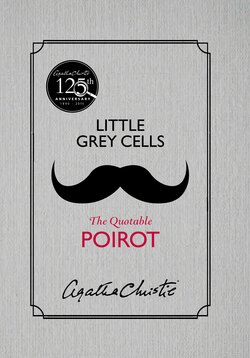Читать книгу Little Grey Cells - Agatha Christie, Georgette Heyer, Mary Westmacott - Страница 6
Оглавление
‘Poirot was an extraordinary-looking little man. He was hardly more than five feet four inches, but carried himself with great dignity. His head was exactly the shape of an egg, and he always perched it a little on one side. His moustache was very stiff and military. The neatness of his attire was almost incredible; I believe a speck of dust would have caused him more pain than a bullet wound. Yet this quaint dandified little man who, I was sorry to see, now limped badly, had been in his time one of the most celebrated members of the Belgian police. As a detective, his flair had been extraordinary, and he had achieved triumphs by unravelling some of the most baffling cases of the day.’
The Mysterious Affair at Styles
How did the character of Hercule Poirot come into being?
Difficult to say – and I realise that he made his appearance not at all in the manner he himself would have wished! ‘Hercule Poirot first,’ he would have said, ‘and then a plot to display his remarkable talents to the best advantage.’ But it was not so. The plot of the story, The Mysterious Affair at Styles, was roughed out, and then came the dilemma: a detective story – now what kind of detective?
It was in the early autumn of 1914 – Belgian refugees were in most country places. Why not have a Belgian refugee, a former shining light of the Belgian Police force?
What kind of a man should he be? A little man, perhaps, with a somewhat grandiloquent name. Hercule something? Hercule Poirot? Yes, that would do. He should be very neat – very orderly. (Is that because I am a wildly untidy person myself?)
Such was the first rough outline – mostly, you will note, externals – but certain traits followed almost automatically. Like many small dandified men, he would be conceited and he would of course (why, of course!) have a handsome moustache.
That was the beginning. Hercule Poirot emerged from the mists and took concrete shape and form. There was more in the little man than I had ever suspected. There was, for instance, his intense interest in the psychology of every case. As early as The Murder on the Links he was showing his appreciation of the mental processes of a murderer and insisting that every crime had a definite signature. Method and order still meant much to him.
And now, what of the relations between us – between the creator and the created? Well – let me confess it – there has been at times a coolness between us! There are moments when I have felt: ‘Why–why–why did I ever invent this detestable, bombastic, tiresome little creature?’
Eternally straightening things, eternally boasting, eternally twirling his moustache and tilting his egg-shaped head. Anyway, what is an egg-shaped head? When people say to me, ‘Which way up is the egg?’ – do I really know? I don’t, because I never do see pictorial things clearly, but nevertheless I know that he has an egg-shaped head covered with suspiciously black hair, and I know his eyes occasionally shine with a green light. Twice in my life I have actually seen him – once on a boat going to the Canary Islands, and once having lunch at the Savoy. I have said to myself: ‘Now, if you had only had the nerve, you could have “snap-shotted” that man in the boat, and then when people have said, “Yes, but what is he like?” you could perhaps have produced that snap shot and explained matters.’ But life is full of lost opportunities.
If you are doubly burdened, first by acute shyness, and secondly by only seeing the right thing to do or say twenty-four hours later, what can you do? Only write about quick-witted men and resourceful girls, whose reactions are like greased lightning!
Yes, there have been moments when I have disliked M. Hercule Poirot very much indeed, when I have rebelled bitterly against being yoked to him for life. (Usually at one of these moments I receive a fan letter saying: ‘I know you must love your little detective by the way you write about him.’)
But now, I must confess it, Hercule Poirot has won. A reluctant affection has sprung up for him. He has become more human, less irritating. I admire certain things about him – his passion for the truth, his understanding of human frailty, and his kindliness. And he has taught me something – to take more interest in my own characters; to see them more as real people and less as pawns in a game.
In spite of his vanity he often chooses deliberately to stand aside and let the main drama develop. He says, in effect, ‘It is their story – let them show you why and how this happened.’ He knows, all right, that the star part is going to be his later. He may make his appearance at the very end of the first act, but he will take the centre of the stage in the second act, and his big scene at the end of the third act is a mathematical certainty.
19 January 1938
